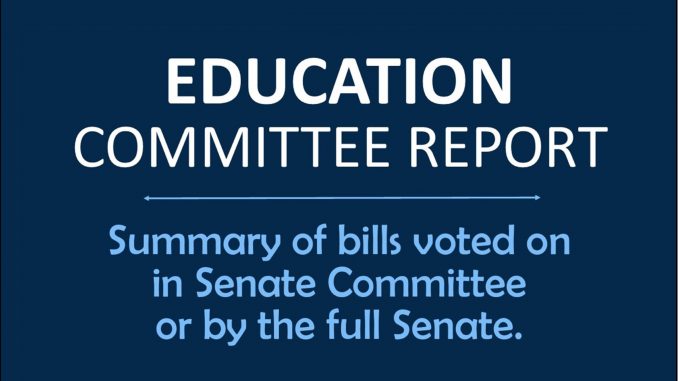
HF 596 – Whole grade sharing incentives extension
HF 609 – Legalizing act for Bennett CSD
SF 603 – Funding for dual enrollment, allowing it to replace required courses
FLOOR ACTION:
HF 596 – Whole grade sharing incentives extension
HF 596 extends the state’s school district reorganization incentives that are set to expire at the end of FY20. Currently, school districts that participate in whole grade sharing are eligible to receive supplementary weighting for three years. If the school districts reorganize, they may be eligible to receive supplementary weighting for six years. In addition to supplementary weighting, school districts that reorganize may be eligible for a uniform levy rate reduction for three years. HF 596 extends these reorganization provisions authorized on or before July 1, 2019, to July 1, 2024. State aid costs associated with each of these supplementary weightings vary due to the size and number of districts that are eligible to receive supplementary weighting. In recent years, the minimum total state aid generated from whole grade sharing and reorganization incentives was $2.9 million and the maximum was $5.6 million.
[4/25: 50-0]
HF 609 – Legalizing act for Bennett CSD
HF 609 legalizes the action of the Bennett Community School District to participate in an instructional support program, notwithstanding that the school district did not wait the required 28 days before certifying its board’s action to the Department of Management.
[4/26: 48-0 (Excused: Lykam, T. Taylor)]
SF 603 – Funding for dual enrollment, allowing it to replace required courses
SF 603 has three main provisions and is estimated to cost between $1 million and $3 million. It also will require a $108,000 for a new FTE at Iowa Department of Education.
First, SF 603 increases supplementary weighting for liberal arts concurrent/dual enrollment from .46 to .50.
Second, the bill allows concurrent enrollment programs to supplant, rather than supplement, two high school courses currently required to be “offered and taught” under the state’s educational standards. The bill allows one of the required science or math units to be taught under dual enrollment if the number of pupils enrolled exceeds five and the school district’s total enrollment does not exceed 600 pupils. Public school with more than 600 students may use college classes to count for one existing “offer and teach” requirement for science or math, but they will not receive additional/weighted funding. This is estimated to increase the school aid amount by $2 million.
Before schools can use the program, they must show a “good faith effort” to hire a certified high school teacher for the courses. Additionally, the bill adds requirements before a high school course can be supplanted:
- Enrollment of the unit must exceed five students.
- The unit must be offered during the regular school day.
- The unit is made accessible by the school district to all eligible students.
The bill expands the Chapter 709 sexual exploitation language to provide additional protects for high school students when taking community colleges courses. Community college instructors are not currently considered school employees for purposes of sexual misconduct/assault on a minor by a school employee. This would close that loophole.
Third, the bill provides new state funding to pay for concurrent community college enrollment of private school students. Like new student population thresholds for public schools, accredited private schools can use concurrent enrollment to supplant one science or math course. They can get “extra funding” if they have student populations less than 200 students. If a nonpublic school has more than 200 enrolled students, they can still use community colleges to cover offer and teach requirements, but no extra/weighted funding will be provided. This provision has an appropriation of $1 million in the Higher Education budget. If the nonpublic schools exceed this, funding will be pro-rated to the community colleges.
[4/26: 48-0 (Excused: Lykam, T. Taylor)]
